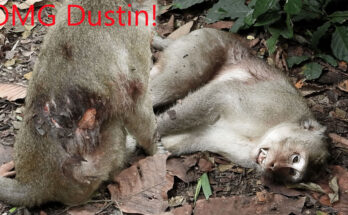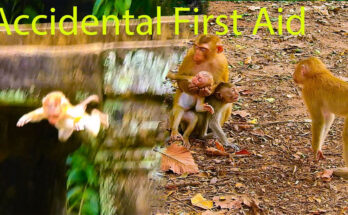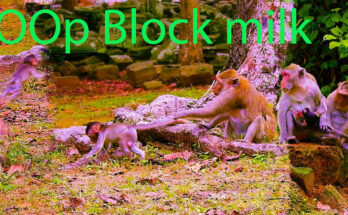What’s Wrong with Cute Baby Monkeys?
Baby monkeys are undeniably adorable. Their tiny faces, expressive eyes, and playful nature make them irresistible to many people. The internet is flooded with videos and images of baby monkeys, often dressed in clothes, drinking from bottles, or clinging to their human caretakers. However, behind the seemingly innocent fascination with these creatures lies a darker reality. The exotic pet trade, unethical breeding practices, and the mistreatment of these animals in captivity raise serious concerns about the welfare of baby monkeys.
The Exotic Pet Trade
One of the biggest issues surrounding baby monkeys is their role in the exotic pet trade. Many people, drawn in by their cuteness, buy these animals as pets without understanding the immense responsibility involved. Monkeys are not domesticated animals like cats or dogs; they have complex social, physical, and psychological needs that are difficult to meet in a human home.
In many cases, baby monkeys sold as pets are taken from their mothers at an extremely young age. This separation is traumatic for both the mother and the infant. In the wild, baby monkeys rely on their mothers for survival, social learning, and emotional support. When they are forcibly removed, they miss out on crucial developmental stages, leading to behavioral and emotional issues later in life.
Additionally, the demand for baby monkeys fuels illegal wildlife trafficking. Poachers often kill mother monkeys to capture their babies, which are then sold on the black market. This practice not only threatens wild populations but also exposes baby monkeys to dangerous and inhumane conditions during transport and captivity.
Unethical Breeding Practices
Even when baby monkeys are not taken from the wild, they are often bred in unethical facilities. Monkey breeding farms prioritize profit over animal welfare, keeping monkeys in cramped, unsanitary conditions. Breeding females are often forced to reproduce frequently, leading to health problems and increased stress.
Many breeders sell baby monkeys at just a few weeks old, falsely claiming that early human bonding will make them better pets. However, this premature separation from their mothers leads to long-term psychological problems. Many pet monkeys develop anxiety, aggression, and self-harming behaviors as they grow older.
The Challenges of Keeping a Pet Monkey
People who buy baby monkeys often do not realize the lifelong challenges of keeping them. While they may be small and manageable as infants, monkeys grow into strong, intelligent, and highly active animals that require constant mental and physical stimulation. They can live for decades—sometimes up to 40 years—making them a long-term commitment.
As monkeys mature, they often become aggressive, territorial, and difficult to control. They may bite, scratch, and attack their owners or other pets. Unlike domesticated animals, monkeys do not adapt well to human lifestyles. Many owners find themselves overwhelmed and either surrender their pets to sanctuaries or, worse, abandon them. Unfortunately, sanctuaries are often overcrowded, and many pet monkeys end up being euthanized due to a lack of proper facilities to care for them.
Exploitation in Online Content
Another growing issue is the exploitation of baby monkeys for online content. Videos featuring baby monkeys being bathed, dressed up, or given pacifiers may seem harmless, but many of these animals are kept in unnatural and stressful conditions purely for entertainment. Some content creators even stage “rescue” videos, pretending to save monkeys from danger when they were never in harm’s way to begin with.
There are also disturbing trends where baby monkeys are intentionally put in distressing situations to provoke emotional reactions from viewers. Some handlers neglect or mistreat the monkeys behind the scenes, knowing that videos of sad or struggling animals can generate millions of views and high engagement. These unethical practices contribute to animal suffering and mislead audiences into thinking these monkeys are being cared for properly.
The Importance of Conservation and Ethical Treatment
Instead of supporting the pet trade or engaging with exploitative content, animal lovers should focus on conservation efforts and ethical treatment of monkeys. Monkeys belong in the wild or in sanctuaries where they can live in social groups and exhibit natural behaviors.
Supporting reputable wildlife organizations, learning about monkey conservation, and advocating against illegal pet trade are better ways to appreciate these incredible animals. Educating others about the realities of keeping pet monkeys can also help reduce the demand for baby monkeys as pets.
Conclusion
While baby monkeys are undeniably cute, the realities of their lives in captivity are far from adorable. The exotic pet trade, unethical breeding, and mistreatment of monkeys for online content all contribute to widespread suffering. Instead of treating them as pets or entertainment, we should respect and protect these intelligent and social creatures by supporting conservation efforts and ethical treatment. Loving animals means ensuring they live in environments where they can thrive, not in homes or cages where they suffer.


